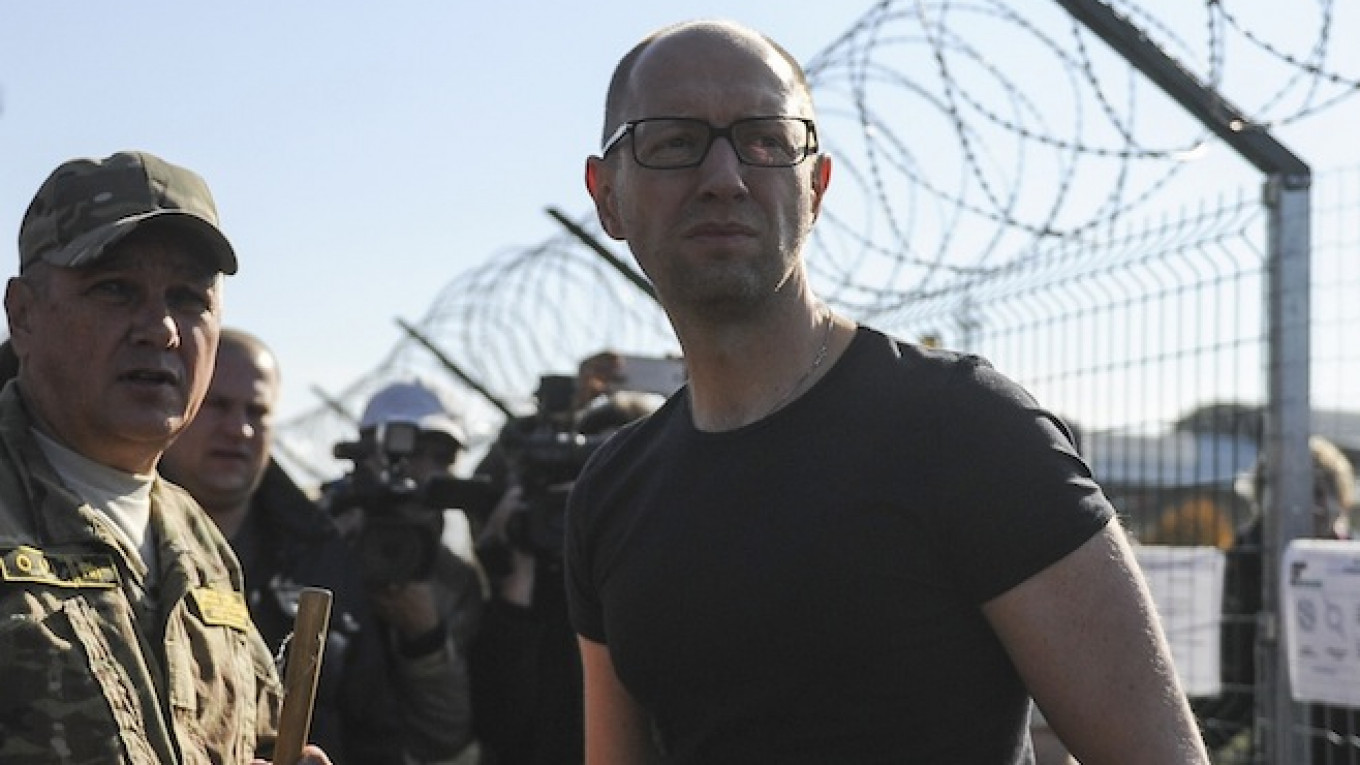KIEV — Ukraine's prime minister warned on Thursday of possible attempts by Russia to disrupt an election in Ukraine on the weekend, a vote being held against a background of Russian support for separatists and an unresolved dispute over gas.
Sunday's poll is the first parliamentary election since street protests last winter drove Moscow-backed leader Viktor Yanukovych from office and ushered in a pro-Western leadership.
The results are expected to turn a political bloc supporting President Petro Poroshenko into the leading force in parliament, where pro-Russian influence will be greatly diminished.
That should provide Poroshenko with a mandate to press ahead with a plan to end the conflict with separatists in Russian-speaking eastern regions and establish an understanding with Moscow while pursuing a course of European integration.
Western governments supported the so-called Euromaidan winter protests in Kiev that forced Yanukovych to flee to Russia, but Moscow denounced his overthrow as a coup. Russia went on to annex Crimea and back separatists in a conflict that has killed more than 3,700 people.
With violence between government forces and separatists still simmering in eastern Ukraine despite a ceasefire, Prime Minister Arseniy Yatsenyuk, a hawk in the Kiev leadership, ordered a full security mobilization for the weekend to prevent "terrorist acts" being carried out.
"It is clear that attempts to destabilize the situation will continue and be provoked by the Russian side. They did not succeed during the presidential election [in May] … but their plans have remained," he told a meeting of top security chiefs and election monitors.
"We need … full mobilization of the whole law-enforcement system to prevent violations of the election process and any attempts at terrorist acts during the elections," Yatsenyuk said.
There was no immediate reaction from Moscow to his charges.
But Russian foreign ministry spokesman Alexander Lukashevich said that Russia hoped the election would be held in accordance with "democratic principles and norms," and that "a process of gradual political stabilization" of Ukraine would follow, the RIA news agency reported.
Lukashevich said Russians would take part in monitoring the vote as part of an observer mission of the Organization for Security and Cooperation in Europe (OSCE).
"Realistically, we are in a state of Russian aggression and we have before us one more challenge: to hold parliamentary elections. … The choice [of voters] will be made by the ballot paper and an honest expression of will, and not automatic weapons," Yatsenyuk said.
An unresolved dispute over gas between Ukraine and its main energy supplier, Russia, is also severely testing relations and raising concerns among European Union countries, many of whom rely on Russian gas via Ukraine, that it could affect supplies to them during winter.
The two powers have agreed on a new price for Russian gas at $385 per thousand cubic meters, but are still at odds over the volumes to be supplied and the level of Ukraine's debt for previous supplies, which Moscow puts at $4.6 billion.
The Soviet-era central heating system in Ukraine is largely gas-powered and, with temperatures set to drop below freezing this weekend as the election takes place, Ukrainian authorities have switched on heating in apartment blocks 10 days ahead of time.
But with supplies of coal from the east disrupted by separatist action, there has been a run on sales of electric radiators in shops as Ukrainians scramble to find alternative sources of warmth over winter.
In Kiev, one of the main botanical gardens announced it could no longer keep greenhouses heated and offered up its stocks of tropical blooms and flora for sale.
Interior Minister Arsen Avakov said that 61,000 police would be responsible for guarding polling stations across the country of 46 million. Of those, 4,000 will be members of special forces who can react rapidly to any threat of "terrorist" action.
The annexation of Crimea means the loss of 12 seats from the 450-seat parliament, and separatist action in the east will prevent polling in at least 14 voting districts there.
Separatists say they plan to hold rival elections on Nov. 2 in the territory they control to further their demands for independence.
A Message from The Moscow Times:
Dear readers,
We are facing unprecedented challenges. Russia's Prosecutor General's Office has designated The Moscow Times as an "undesirable" organization, criminalizing our work and putting our staff at risk of prosecution. This follows our earlier unjust labeling as a "foreign agent."
These actions are direct attempts to silence independent journalism in Russia. The authorities claim our work "discredits the decisions of the Russian leadership." We see things differently: we strive to provide accurate, unbiased reporting on Russia.
We, the journalists of The Moscow Times, refuse to be silenced. But to continue our work, we need your help.
Your support, no matter how small, makes a world of difference. If you can, please support us monthly starting from just $2. It's quick to set up, and every contribution makes a significant impact.
By supporting The Moscow Times, you're defending open, independent journalism in the face of repression. Thank you for standing with us.
Remind me later.


